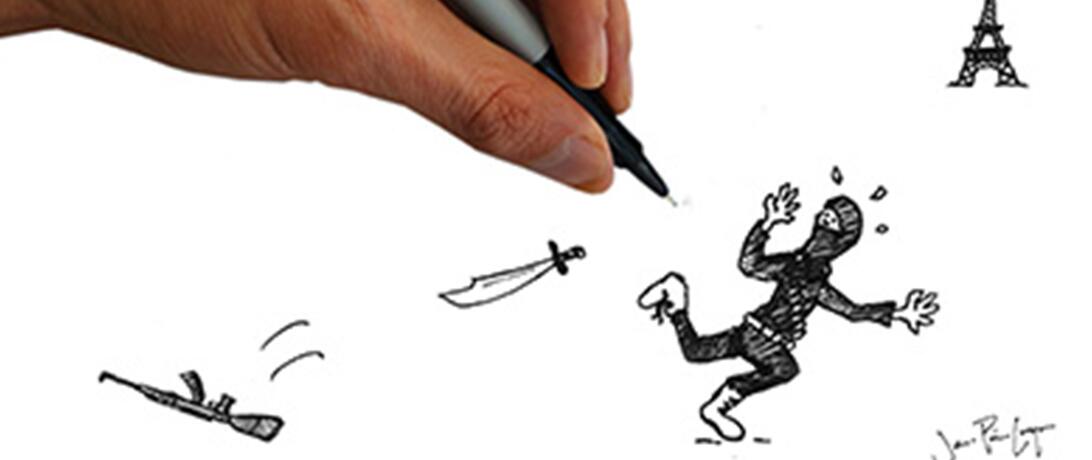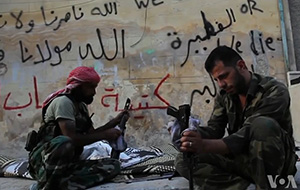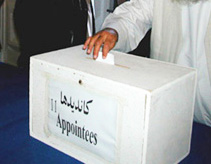
If we allow our reaction to barbarism to be dictated on the fly and by the perpetrators themselves, we condemn the global community to ongoing terror. We need to think differently.
 Despite what seems like compelling evidence that peaceful tactics of political expression are superior to violence, the world continues to bear witness to incoherent brutality on an almost daily basis. Recent attacks in Paris, Nigeria, and Yemen exemplify a type of terrorism all very common in contemporary life. Small groups of militants use low-cost tactical approaches to perpetrate barbarous acts against noncombatants, frequently civilians. The reaction to those groups responsible is usually a swift global condemnation followed by calls (and sometimes action) for a security crackdown. But the track record of these reactions isn’t great. One of the most brazen attacks of 2014 remains effectively unanswered. The military campaign to free nearly 300 schoolgirls following the militant group Boko Haram’s kidnapping in April 2014 has been mired in political wrangling and failure. The #BringBackOurGirls campaign has virtually ended. In a nutshell, global condemnation coupled with a military response does not appear to be adequate. In fact, empirical evidence suggests that the military component may actually be damning. Militant groups have crafted effective narratives framing government crackdowns as justification for both their existence and an increasingly militant response. The pattern seems to have the global community in a near constant state of tail chasing.
Despite what seems like compelling evidence that peaceful tactics of political expression are superior to violence, the world continues to bear witness to incoherent brutality on an almost daily basis. Recent attacks in Paris, Nigeria, and Yemen exemplify a type of terrorism all very common in contemporary life. Small groups of militants use low-cost tactical approaches to perpetrate barbarous acts against noncombatants, frequently civilians. The reaction to those groups responsible is usually a swift global condemnation followed by calls (and sometimes action) for a security crackdown. But the track record of these reactions isn’t great. One of the most brazen attacks of 2014 remains effectively unanswered. The military campaign to free nearly 300 schoolgirls following the militant group Boko Haram’s kidnapping in April 2014 has been mired in political wrangling and failure. The #BringBackOurGirls campaign has virtually ended. In a nutshell, global condemnation coupled with a military response does not appear to be adequate. In fact, empirical evidence suggests that the military component may actually be damning. Militant groups have crafted effective narratives framing government crackdowns as justification for both their existence and an increasingly militant response. The pattern seems to have the global community in a near constant state of tail chasing.
If we allow our reaction to barbarism to be dictated on the fly and by the perpetrators themselves, we condemn the global community to ongoing terror. We need to think differently.
 One way to reframe terrorism is as a strategic problem instead of a societal vice. Violence is not an end; it is a means to some political end. One would be hard pressed to find a terrorist group that uses violence for violence’s sake. It is a tool. Groups choose to use it because they expect it will yield some utility. Misunderstanding this utility is why terrorism often seems so irrational to many. To what end do the attacks in Paris serve? The obvious answer is that the perpetrators hope to dissuade others from engaging activities similar to Charlie Hebdo. Another possibility is that the perpetrators hope to rally potential supporters to their cause by demonstrating their willingness to use extreme measures. Though deplorable, these logics seem simple enough. Why does a group like Boko Haram massacre isolated Nigerian villages? From the outside, this is a little more difficult to understand. Villagers pose little to no threat (or benefit) to either Boko Haram or the government. And I doubt anybody is uncertain about Boko Haram’s willingness to use brutality in the name of their cause. But the attacks may cause villagers to flee from an area where the government was counting on voters for an upcoming election. It may also be useful to create antagonism between the international community and the Nigerian government. Nonetheless, the attacks serve some end beyond their inherent savagery.
One way to reframe terrorism is as a strategic problem instead of a societal vice. Violence is not an end; it is a means to some political end. One would be hard pressed to find a terrorist group that uses violence for violence’s sake. It is a tool. Groups choose to use it because they expect it will yield some utility. Misunderstanding this utility is why terrorism often seems so irrational to many. To what end do the attacks in Paris serve? The obvious answer is that the perpetrators hope to dissuade others from engaging activities similar to Charlie Hebdo. Another possibility is that the perpetrators hope to rally potential supporters to their cause by demonstrating their willingness to use extreme measures. Though deplorable, these logics seem simple enough. Why does a group like Boko Haram massacre isolated Nigerian villages? From the outside, this is a little more difficult to understand. Villagers pose little to no threat (or benefit) to either Boko Haram or the government. And I doubt anybody is uncertain about Boko Haram’s willingness to use brutality in the name of their cause. But the attacks may cause villagers to flee from an area where the government was counting on voters for an upcoming election. It may also be useful to create antagonism between the international community and the Nigerian government. Nonetheless, the attacks serve some end beyond their inherent savagery.
If violence is a tool, how can we make it less useful? The most obvious answer is to not capitulate. The US, for instance, has a pretty firm policy against paying ransoms when a terrorist group takes hostages. This makes a good deal of sense and the people serving in those institutions charged with enforcing this policy have layers of institutional bureaucracy to buffer this position. But when terrorists attack other entities (e.g. ships on the high sea, oil workers, journalists, etc…), things get a little trickier. Families often negotiate ransoms for their loved ones and who can really fault them for doing so? Media outlets capitulate to demands to protect themselves. Sony pulled The Interview, the AP deleted pictures of Mohamad…neither seem like good strategy in dealing with a potential global threat, but I’m certain these are carefully considered choices on the part of both businesses.
As terrorists turn their focus away from governmental targets and towards private entities, what can the global community do to decrease the marginal utility of violence? One factor we ought to consider more seriously is that terrorist groups are extremely sensitive to the preferences of their supporters. In her groundbreaking analysis on why terrorist groups collapse, Cronin contends that,
…most terrorist groups disintegrate, falling under the weight of their own unpopular tactics….Marginalization from their constituency is the death-knell for modern groups. Even groups that are small, clandestine, and peripatetic find it difficult to survive if they have neither active nor passive support from a surrounding population.[1]
This should not come as a surprise; these groups have political agendas and involve often highly contentious political constituencies. Governments’ counter terror policies have attempted to undermine support for these groups by stepping up their social service provision in areas where these groups are based. This is part of modern day hearts and minds counterinsurgency. But instead of co-opting supporters, if we suspect terrorism is as universally deplorable as the global reaction seems to indicate, why not do more to support governance mechanisms that enable domestic constituencies to more easily punish groups for terrorist tactics?
For instance, in a recent paper I find that terrorist groups that participate in democratic elections are much less likely to attack civilians. Why? I surmise that it’s because groups’ civilian constituents don’t like terrorism and elections give them a way to punish a group for “bad behavior”. Elections effectively offer civilians a stick; the more things a group does to distance itself from its civilian constituents (like attacking innocent civilians), the less likely it will get the political support it needs to win elections.
 To be clear, I’m not advocating bringing all terrorist groups into some sort of democratic political fold. This would certainly be disastrous in many places. However, I think we can do more to support governance mechanisms that enable local domestic populations to hold these groups accountable. How can we better enable local populations to censure terrorist groups operating de facto in their name? Protecting non-violent protestors and enhancing the voice of local dissenters are two ideas that come to mind immediately. Increasing the capabilities and acceptance of local police is another idea. Exposing operational information is a serious threat to clandestine terrorist groups, which is one reason why local supporters are so important. Locals often provide support to the groups (e.g. safe houses, escape, and tactical resources). The more a police force is viewed favorably, the more easily information about these details will flow between civilians and police. If terrorist groups can’t rely on the bad graces of a police force (and long-standing ones often can-consider the reputation of the police in Belfast, Northern Ireland during the Troubles), they have very limited local options.
To be clear, I’m not advocating bringing all terrorist groups into some sort of democratic political fold. This would certainly be disastrous in many places. However, I think we can do more to support governance mechanisms that enable local domestic populations to hold these groups accountable. How can we better enable local populations to censure terrorist groups operating de facto in their name? Protecting non-violent protestors and enhancing the voice of local dissenters are two ideas that come to mind immediately. Increasing the capabilities and acceptance of local police is another idea. Exposing operational information is a serious threat to clandestine terrorist groups, which is one reason why local supporters are so important. Locals often provide support to the groups (e.g. safe houses, escape, and tactical resources). The more a police force is viewed favorably, the more easily information about these details will flow between civilians and police. If terrorist groups can’t rely on the bad graces of a police force (and long-standing ones often can-consider the reputation of the police in Belfast, Northern Ireland during the Troubles), they have very limited local options.
Ultimately this boils down to a couple simple points. If we let a group’s strategic choices limit ours, we won’t get anywhere. If we don’t do more to enable local populations, we can pretty much count on continuing to chase down small bands of terrorists who view violence as a winning strategy. We need more creative governance solutions aimed at de-linking terrorists from societies.
[1] Cronin, Audrey Kurth. 2009. How Terrorism Ends: Understanding the Decline and Demise of Terrorist Campaigns. Princeton University Press. P. 203.
Article Details
Published
Written by
Topic
Program
Content Type
Opinion & Insights